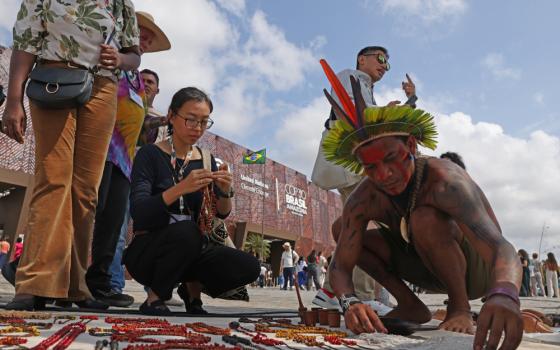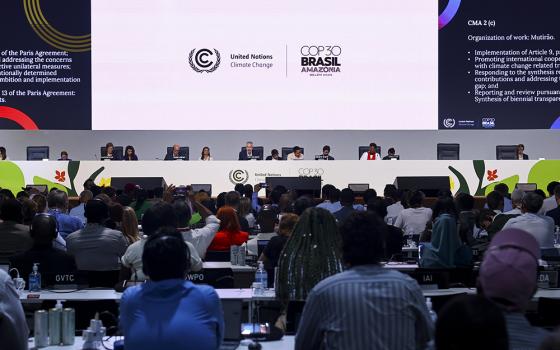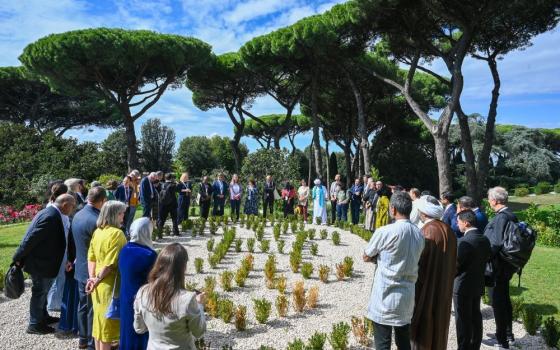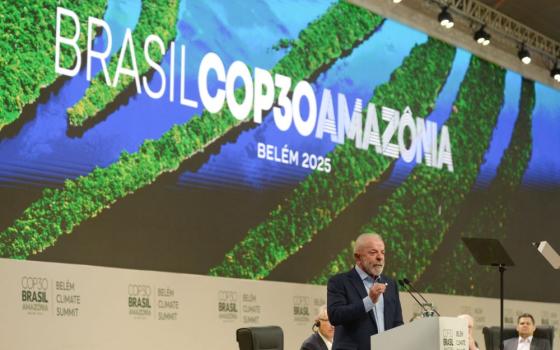Fishermen work on Lake Victoria, whose rising waters frequently displace residents and damage property in western Kenya. (GSR photo/Doreen Ajiambo)
On a warm afternoon along the banks of a narrow river that feeds into Lake Victoria, residents of this small village in western Kenya gathered beneath a mango tree to decide who would plant the first bamboo — a small act marking the start of their effort to reclaim degraded riverbanks and adapt to a changing climate.
What might seem like a small village decision carries far greater weight. For local residents, Catholic leaders and climate advocates alike, the choice of who plants the first bamboo symbolizes something larger — the struggle of vulnerable communities to restore their land and survive as climate change reshapes their lives.
The same questions echo far beyond this riverside village, reaching all the way to Belém, Brazil, where world leaders will gather Nov. 10-21 for COP30 to confront broken promises around adaptation finance, loss and damage, and climate justice.
That urgency will hang over COP30, the United Nations climate summit to be held in the Amazon. The story unfolding here, where families displaced by flooding are experimenting with bamboo to protect their homes and farms, shows what is at stake.
"The questions villagers are asking, who gets help first, who benefits from carbon markets, who bears the costs, are the same questions world leaders must answer in Belém," said Makokha Christian, an agroforestry consultant working with the U.N. Environment Programme, or UNEP.
'These families are not responsible for global warming, yet they are suffering the most. It is a matter of justice that the world responds.'
—Sr. Celestine Nelima
Lake Victoria has steadily swelled in recent years, fueled by heavier rains and shifting weather patterns. Its backflow into rivers has swallowed farmland, contaminated water, and displaced thousands across western Kenya.
In May 2020, officials reported that more than 100,000 people had been uprooted, including many from Mau Mau. The displacements have continued as floodwaters return season after season.
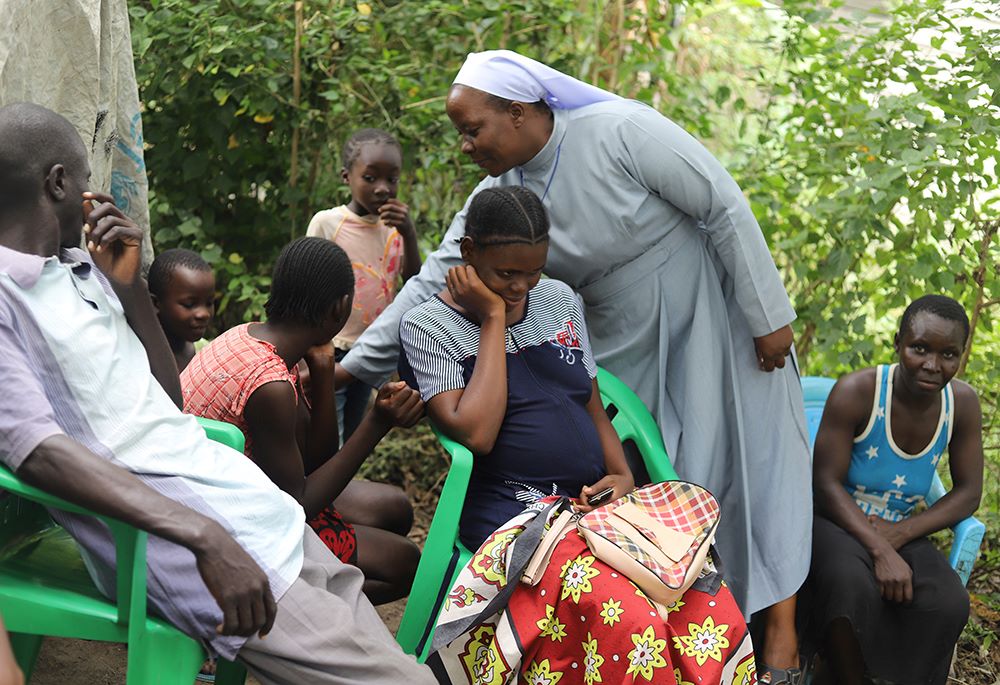
Sr. Celestine Nelima of the Sisters of Mary of Kakamega speaks with flood victims at a displacement camp in Mau Mau village in Busia, western Kenya, on July 17. (GSR photo/Doreen Ajiambo)
"I lost my fishing business because of the floods, and then I lost my maize," said Odhiambo Okoth, a father of five. "Now I depend on relief food."
Faith on the front lines
Catholic priests and sisters have been on the front lines, distributing aid, sheltering families and lobbying for long-term solutions. They echo the appeals of Pope Francis, who repeatedly framed climate change as a moral crisis in Laudato Si' and Laudate Deum.
"This is not just about the environment, it is about human dignity," said Fr. Dennis Oduory, priest of Budalang'i Parish, which covers Mau Mau village and coordinates local church relief efforts. "When families lose their homes and livelihoods, the church must stand with them and the world must not abandon them."
Local sisters say the floods have made visible the inequities Francis warned about. "These families are not responsible for global warming, yet they are suffering the most," said Sr. Celestine Nelima, a member of the Sisters of Mary of Kakamega, who leads Catholic women's groups providing shelter, clothing and food to those affected. "It is a matter of justice that the world responds."
She noted that more than 10,000 people remain displaced in Mau Mau and neighboring villages, an area with a population of about 67,000 residents.
Residents of Mau Mau village stand near flooded plots where they hope to plant bamboo to help prevent future floods. (Tonny Onyulo)
In response to repeated flooding, UNEP launched the Bunyala South Riverbank Restoration Project, introducing bamboo intercropped with maize to stabilize soil, protect riverbanks, and create potential for future carbon credits.
According to Makokha, bamboo's deep roots hold earth in place and absorb excess water, while maize allows families to keep farming as the bamboo matures. Pilot plots are already showing results: Where the river once ate into banks, thick bamboo shoots now sway, shielding healthier maize crops.
"People see the bamboo growing and they start believing again … that maybe they don't have to migrate to cities, that they can stay and farm," Makokha said.
Parishes have joined the effort, urging members to volunteer land and labor. Priests often frame the project as part of the church's duty of creation care.
Yet success has brought new tensions. Only about 15 plots were allocated in a village of several thousand families, and rumors of favoritism spread quickly as farmers competed for a place in the program, one that could eventually generate carbon credits.
"I was among the first to register, but they went to my neighbor's land instead," said Margaret Nabwire, a mother of six whose fields were destroyed by floods.
Okoth, her neighbor, countered: "I built terraces, I planted trees. The project team chose me because they saw my effort."
To ease conflict, church leaders have stepped in as mediators, urging families to treat the project as a shared resource.
"We must stop fighting each other and fight the problem," Nabwire said. "Even if the bamboo doesn't start on my land, it will still help all of us."
Advertisement
Godfrey Khamala, chair of the local flood victims' committee, said the selection criteria, including proximity to riverbanks, erosion risk and land gradient, were based on science, not politics. "If the first plots fail, no one else will get support," he said. "But if they succeed, donors will expand the program, and every family here will benefit."
From Kenya to Brazil
The bamboo groves in Mau Mau are modest, but they symbolize the kind of resilience projects climate-vulnerable communities worldwide are crafting to survive. Without large-scale international financing, however, such efforts remain fragile.
That is why Catholic leaders are tying their local appeals to the global stage. Bishops across Africa have called on negotiators heading to COP30 to prioritize adaptation finance and loss-and-damage funds. They frame it not just as economics but as faith.
"When the poorest are left behind, it is a violation of God's creation and of our shared humanity," Oduory said.
Francis echoed those concerns, urging the international community to recognize a "climate debt" owed to nations like Kenya. He warned that ignoring the plight of the displaced undermines global solidarity.
Makokha Christian, an agroforestry consultant with the U.N. Environment Programme, inspects bamboo growing alongside maize on a farm in Mau Mau village, western Kenya. (Tonny Onyulo)
For villagers like Nabwire, such high-level debates feel distant, but their outcomes matter. She and other farmers are now lobbying for group applications so several households can pool land for bamboo.
"We are not asking for miracles," she said, gazing at the swollen water where her farm once stood. "We just want the world to remember we are here, and we are fighting to survive."
Despite frustrations, the bamboo stands are already shifting the mood in Mau Mau. Where despair once reigned, there is now cautious optimism that green shoots can anchor not only soil but hope.
Catholic leaders say that hope itself is a form of resilience, one that global leaders should not underestimate.
"Planting bamboo is one way," Oduory said. "But planting hope in people's hearts is the real mission of the church in times like these."
Tonny Onyulo contributed to this report from western Kenya.




